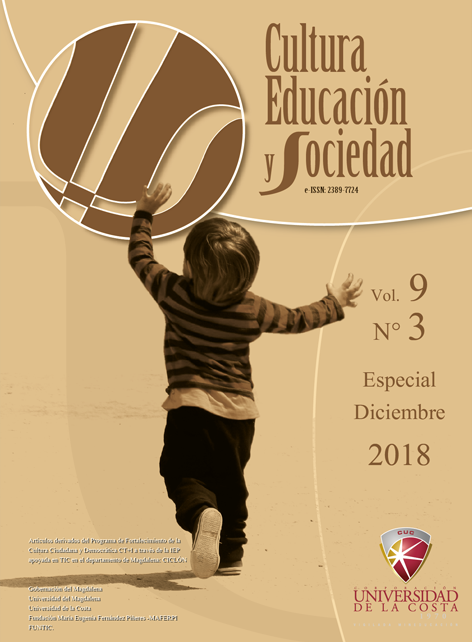Information and Communication Technologies: A strategy to strengthen training in environmental education.
DOI:
https://doi.org/10.17981/cultedusoc.9.3.2018.78Keywords:
Information and communication technology, pedagogical strategies, environmental educationAbstract
This article shows the results of the Information and Communication Technologies (ICT), in its wide use at present, it offers an important alternative to apply in the educational area. The purpose of this research project is to strengthen educational processes through pedagogical strategies for the strengthening of environmental education through the use of ICT in the Manuel Salvador Meza Camargo Departmental Educational Institution of the Municipality of Sabana de San Ángel Magdalena, through the implementation of playful-pedagogical workshops, which allow acquiring skills, abilities and competences in different areas, leading to active participation in activities led by the different actors that are part of the educational community. It was possible to identify that students have knowledge about the subject, however, it is essential to develop strategies for the strengthening and permanence of environmental education in the institution.
Downloads
References
Betancur, S., Carmona, L., Contreras, R., Karam, J., Maestre, N., Romero, Y., & Uribe, S. (2014). Videojuegos y tic como Estrategias Pedagógicas: Formación para el uso seguro de internet. Cultura Educación y Sociedad, 5(1). Recuperado a partir de https://revistascientificas.cuc.edu.co/culturaeducacionysociedad/article/view/997
Blasco M. y Pérez J. (2007). Metodologías de investigación en las ciencias de la actividad física y el deporte. Sant Vicente (Alicante): Editorial Club Universitario.
Bravo, H. (2008). Estrategias pedagógicas. Córdoba: Universidad del Sinú
Fajardo, J.. (2007). Desafíos de la educación. Martes, 12 de Junio de 2007. Publicado el 11/05/2007 El Mundo. Editorial. Plan Nacional Decenal de educación PNDE 2006-2016 http://www.plandecenal.edu.co/html/1726/w3-article-126746.html
Fernández, O.; Luquez, P.; Leal, E. (2010) Procesos socio-afectivos asociados al aprendizaje y práctica de valores , en el ámbito escolar .Telos, Vol. 12, Núm. 1, pp. 63-78 Universidad Rafael Belloso Chacín, Venezuela. Disponible en: http://redalyc.uaemex.mx/src/inicio/ArtPdfRed.jsp?iCve=99312518005.
Franco, S. M. (2012). - La educación como Praxis Transformadora. Universidad Pedagógica Nacional.
Hernández, R., Fernández, C. y Baptista, P. (2014). Metodología de la investigación. México, D.F.: McGraw-Hill Education.
Hinostroza, J. (2004). Diseño de estrategias de innovación y TIC para el desarrollo de la educación. Innovar en la enseñanza y enseñar a innovar.
Consultado en: http://www.expansiva.cl/media/en_foco/documentos/05052004211607.pdf.
Marín González, F., Niebles, M., Sarmiento, M., Valbuena, S. (2017): Mediación de las tecnologías de la información en la comprensión lectora para la resolución de problemas aritméticos de enunciado verbal. Espacios Recuperado de: 38(20) http://www.revistaespacios.com/a17v38n20/a17v38n20p20.pdf
Martínez-Otero, V., & Ojeda, G. (2011). Análisis pedagógico de plataformas audiovisuales mediante el modelo pentadimensional del discurso educativo. Revista Iberoamericana De Educación, 57(2011).. Retrieved from https://dialnet.unirioja.es/servlet/articulo?codigo=4770798
Monsalve, M. (2011). Implementación de las tics como estrategia didáctica para generar un aprendizaje significativo de los procesos celulares en los estudiantes de grado sexto de la institución educativa San Andrés del Municipio de Girardota.. Bdigital.unal.edu.co. Retrieved from http://www.bdigital.unal.edu.co/5936/1/43666105.2012.pdf .
Patiño Builes, A. (2015). Tendencias tecnológicas que influyen en el aumento de la productividad empresarial. INGE CUC, 11(2), 84-96.
https://doi.org/10.17981/ingecuc.11.2.2015.09
Pereira, M. (2016). Hacia la construcción de un derecho energético ambiental como disciplina autónoma. Jurídicas CUC, 12(1), 177-204. DOI: http://dx.doi.org/10.17981/juridcuc.12.1.2016.10
Pérez, G. (2002). Investigación cualitativa. Retos e interrogantes. II técnicas y análisis de datos. Madrid: la Muralla S.A.
Pérez-Acosta, A. & Urrá, M. (2015). El Premio Rubén Ardila a la investigación científica en psicología (2005-2015): De la psicología organizada a la historia de las ciencias del comportamiento. Cultura Educación y Sociedad, 6(2), 77-89. Recuperado de: https://revistascientificas.cuc.edu.co/index.php/culturaeducacionysociedad/article/view/1042.
Rodriguez, L. E. (2012). Teoría y Técnica de Entrevista. México. Obtenido de http://www.aliat.org.mx/BibliotecasDigitales/salud/Teoria_y_tecnica_de_la_entrevista.pd.
Schutter, A. (1987). Metodo y proceso de la investigación participativa en la capacitación rural. Patzcuaro, Michoacan: CREFAL.
UNESCO (1975). Carta de Belgrado. (Línea de tiempo ambiental timeline.. Timetoast. Retrieved from https://www.timetoast.com/timelines/linea-de-tiempo-ambiental-4c54c7a7-00e8-4055-b721-273549a7cf4e
Downloads
Published
How to Cite
Issue
Section
License
Copyright (c) 2018 CULTURA EDUCACIÓN Y SOCIEDAD

This work is licensed under a Creative Commons Attribution-NonCommercial-NoDerivatives 4.0 International License.
![]()
Creative Commons 2020 CULTURA EDUCACIÓN Y SOCIEDAD
This article is under international license Creative Commons Reconocimiento-NoComercial-SinObrasDerivadas 4.0.
The published articles are the sole responsibility of their authors and do not necessarily reflect the opinions of the editorial committee.
CULTURA EDUCACIÓN Y SOCIEDAD respects the moral rights of its authors, who assign to the editorial committee the patrimonial rights of the published material. In turn, the authors inform that this work is unpublished and has not been previously published.
All articles are under a:
Licencia Creative Commons Atribución-NoComercial-SinDerivadas 4.0 Internacional.
![]()


 English
English
 Español (España)
Español (España)




_12.53_.27_p_. m_._3.png)





_12.57_.35_p_. m_._3.png)
_12.50_.37_p_. m_._3.png)



